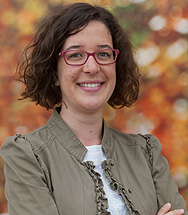A scholarship of the CAN Foundation for research on flashbacks in film in the U.S.
Adriana Gordejuela, doctoral student at ICS, analyzes in her thesis "how flashbacks are elaborated from a technical and poetic point of view, and how this construction leads the viewer to process and understand the narrative unit proposed".

Adriana Gordejuela, a doctoral student of the Institute for Culture and Society (ICS) of the University of Navarra, has obtained a scholarship for Excellence from the Caja Navarra Foundation. The financial aid will be used to finance a research stay with Professor Francis F. Steen at the department of Communication of the University of California-Los Angeles (USA) on flashbacks in cinema, topic of her thesis .
This doctorate is integrated in the project 'Public discourse' of the ICS. Specifically, Adriana studies the cinematographic speech from a multimodal and cognitive approach and focuses on a specific tool : the flashback or temporal retrospection.
What is your research about cinematic flashbacks?
This narrative piece, which corresponds to the literary analepsis and which has been used in literature since its origins, acquires a certain singularity in cinema due to its markedly multimodal character. The construction of a cinematographic flashback brings into play visual and sound resources that, combined to represent a temporal leap from the present to the past, immediately activate in the viewer's mind several cognitive processes, such as the compression of temporal relationships, the integration of points of view or the identity connections between elements of different contexts, among others. In my thesis I analyze how flashbacks are elaborated from a technical and poetic point of view, and how this construction leads the viewer to process and understand the narrative unity proposed.
Why is this research relevant to society?
Our daily interactions are usually multimodal and, moreover, thanks to new technologies, multimodality is one of the characteristic features of the media we use every day to communicate. Therefore, the study of the cognitive mechanisms involved in the creation and comprehension of multimodal discourses is very relevant, and will help to better understand how human beings communicate.
How does your stay in the U.S. fit into your thesis ?
My goal main goal is to work with my co-director, Prof. Francis Steen, and part of his team at UCLA to give a boost to my research. In particular, I will explore the different corpus tagging models (gestural, intonational or visual tagging, among others) that the network Hen Lab is working on -which are being progressively incorporated into the database NewsScape- and their possible application to the analysis of movie clips. The interesting thing about these new models is that they will make it possible to combine linguistic searches in the database with others based on gestural and intonational patterns, for example.
What will working closely with Francis F. Steen bring to you?
Professor Steen, besides being the co-director of my thesis , is an expert in issues of cognitive linguistics and, as a professor of the department of Communication at UCLA, he is also specialized in the multimodal analysis of audiovisual discourses. For all these reasons, I consider that a stay that allows me to work with him for an extended period of time will be very beneficial for research.
